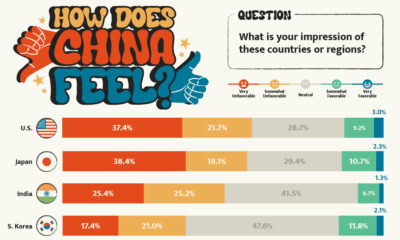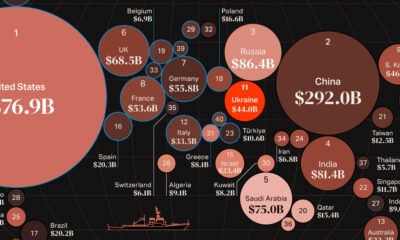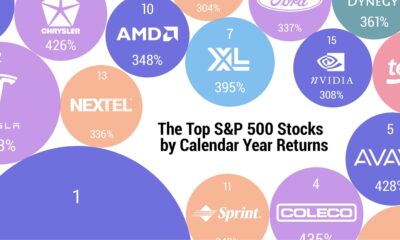Technology
Ranked: The Most Innovative Companies in 2023
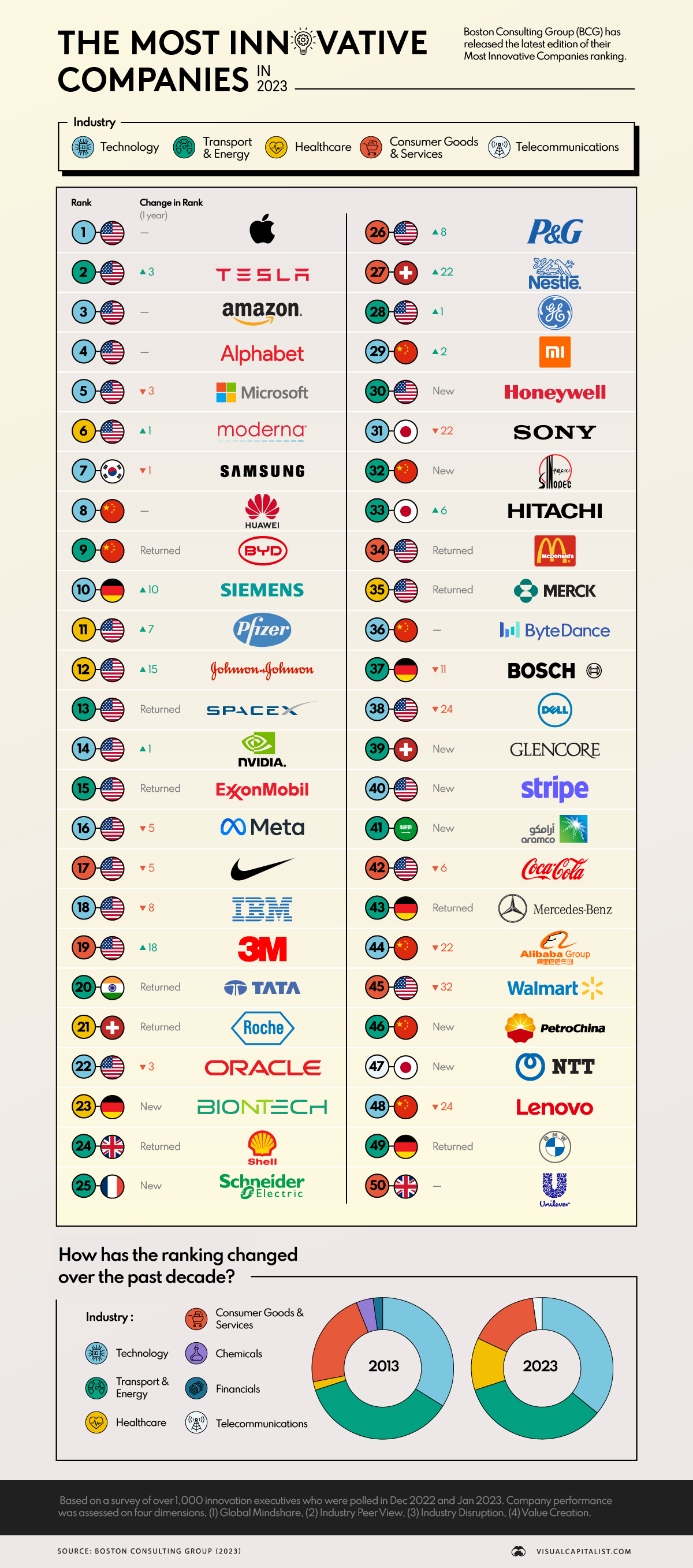
The Most Innovative Companies in 2023
Every year, Boston Consulting Group (BCG) releases their Most Innovative Companies ranking. Based on a survey of over 1,000 innovation executives polled in Dec. 2022 and Jan. 2023, BCG assessed a company’s performance on four dimensions:
- Global mindshare: the number of votes received from all global innovation executives
- Industry peer view: the number of votes received from executives in a company’s own industry
- Industry disruption: the Diversity Index (Herfindahl-Hirschman) of votes across industries
- Value creation: total shareholder return, including share buybacks, over the 3-year period from Jan. 2020 through Dec. 2022.
We’ve provided a more visual representation of these results in the graphic above.
Data and Highlights
The 2023 ranking can be found in the table below.
For the fourth straight year, Apple is considered the most innovative company in the world. In fact, Apple has held this title every year since 2005 with the exception of 2019.
| Rank | Company | Industry | Change in Rank (+ or -) |
|---|---|---|---|
| 1 | 🇺🇸 Apple | Technology | - |
| 2 | 🇺🇸 Tesla | Transportation & energy | +3 |
| 3 | 🇺🇸 Amazon | Technology | - |
| 4 | 🇺🇸 Alphabet | Technology | - |
| 5 | 🇺🇸 Microsoft | Technology | -3 |
| 6 | 🇺🇸 Moderna | Healthcare | +1 |
| 7 | 🇰🇷 Samsung | Technology | -1 |
| 8 | 🇨🇳 Huawei | Technology | - |
| 9 | 🇨🇳 BYD Company | Transportation & energy | Returned |
| 10 | 🇩🇪 Siemens | Technology | +10 |
| 11 | 🇺🇸 Pfizer | Healthcare | +7 |
| 12 | 🇺🇸 Johnson & Johnson | Healthcare | +15 |
| 13 | 🇺🇸 SpaceX | Transportation & energy | Returned |
| 14 | 🇺🇸 Nvidia | Technology | +1 |
| 15 | 🇺🇸 ExxonMobil | Transportation & energy | Returned |
| 16 | 🇺🇸 Meta | Technology | -5 |
| 17 | 🇺🇸 Nike | Consumer goods & services | -5 |
| 18 | 🇺🇸 IBM | Technology | -8 |
| 19 | 🇺🇸 3M | Consumer goods & services | +18 |
| 20 | 🇮🇳 Tata Group | Transportation & energy | Returned |
| 21 | 🇨🇭 Roche | Healthcare | Returned |
| 22 | 🇺🇸 Oracle | Technology | -3 |
| 23 | 🇩🇪 BioNTech | Healthcare | New |
| 24 | 🇬🇧 Shell | Transportation & energy | Returned |
| 25 | 🇫🇷 Schneider Electric | Transportation & energy | New |
| 26 | 🇺🇸 P&G | Consumer goods & services | +8 |
| 27 | 🇨🇭 Nestlé | Consumer goods & services | +22 |
| 28 | 🇺🇸 General Electric | Transportation & energy | +1 |
| 29 | 🇨🇳 Xiaomi | Technology | +2 |
| 30 | 🇺🇸 Honeywell | Transportation & energy | New |
| 31 | 🇯🇵 Sony | Technology | -22 |
| 32 | 🇨🇳 Sinopec | Transportation & energy | New |
| 33 | 🇯🇵 Hitachi | Transportation & energy | +6 |
| 34 | 🇺🇸 McDonald's | Consumer goods & services | Returned |
| 35 | 🇺🇸 Merck | Healthcare | Returned |
| 36 | 🇨🇳 ByteDance | Technology | - |
| 37 | 🇩🇪 Bosch | Transportation & energy | -11 |
| 38 | 🇺🇸 Dell | Technology | -24 |
| 39 | 🇨🇭 Glencore | Transportation & energy | New |
| 40 | 🇺🇸 Stripe | Technology | New |
| 41 | 🇸🇦 Saudi Aramco | Transportation & energy | New |
| 42 | 🇺🇸 Coca-Cola | Consumer goods & services | -6 |
| 43 | 🇩🇪 Mercedes-Benz Group | Transportation & energy | Returned |
| 44 | 🇨🇳 Alibaba | Technology | -22 |
| 45 | 🇺🇸 Walmart | Consumer goods & services | -32 |
| 46 | 🇨🇳 PetroChina | Transportation & energy | New |
| 47 | 🇯🇵 NTT | Telecommunications | New |
| 48 | 🇨🇳 Lenovo | Technology | -24 |
| 49 | 🇩🇪 BMW | Transportation & energy | Returned |
| 50 | 🇬🇧 Unilever | Consumer goods & services | - |
BCG added additional context on several companies in its report, including Germany’s Bosch (37th). According to BCG, the engineering and technology company has a global R&D organization of 84,800 employees across 130 locations. Bosch has also maintained R&D spending (as a share of sales) at between 7.6% and 8.2% from 2018 through 2021.
Another highlight was Samsung (7th), which spent over $17 billion (9% of annual sales) on R&D in 2021, making the South Korean conglomerate one of the world’s largest spenders on innovation. Samsung was also granted 6,300 U.S. patents in 2022, the most out of any company.
As this ranking shows, innovative companies aren’t just tech companies. McDonald’s (34th) is considered by BCG as the “restaurant industry frontrunner in technology innovation and investment”.
For example, McDonald’s recently acquired Apprente, a startup that develops voice-based technologies, and Dynamic Yield, a firm specializing in creating customizable online experiences. McDonald’s aims to leverage these technologies to improve ordering times and offer customers better choices.
Companies by Nationality
Now let’s examine the ranking through a different lens—nationality. The following chart compares the country breakdowns of the 2013 and 2023 rankings.
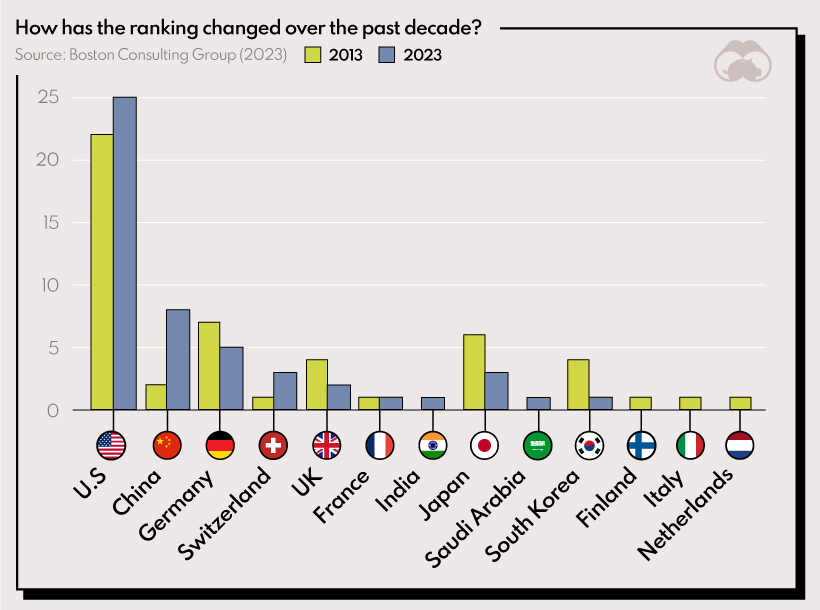
The U.S. and China are the only two countries that have increased their share from 2013, pushing out firms from European countries like Germany, the UK, and Italy. We can also see significant declines in Japanese and South Korean representation.
Given China’s economic growth, it’s likely that Chinese firms will continue to represent more of BCG’s ranking in the future. So far, the country’s strongest innovator is Huawei (8th), which has made the top 50 list every year since 2014, when it debuted at 50th place.
apps
How Long it Took for Popular Apps to Reach 100 Million Users
Threads reached 100 million users in just five days. Here is a timeline of how long other popular platforms took to reach the milestone.
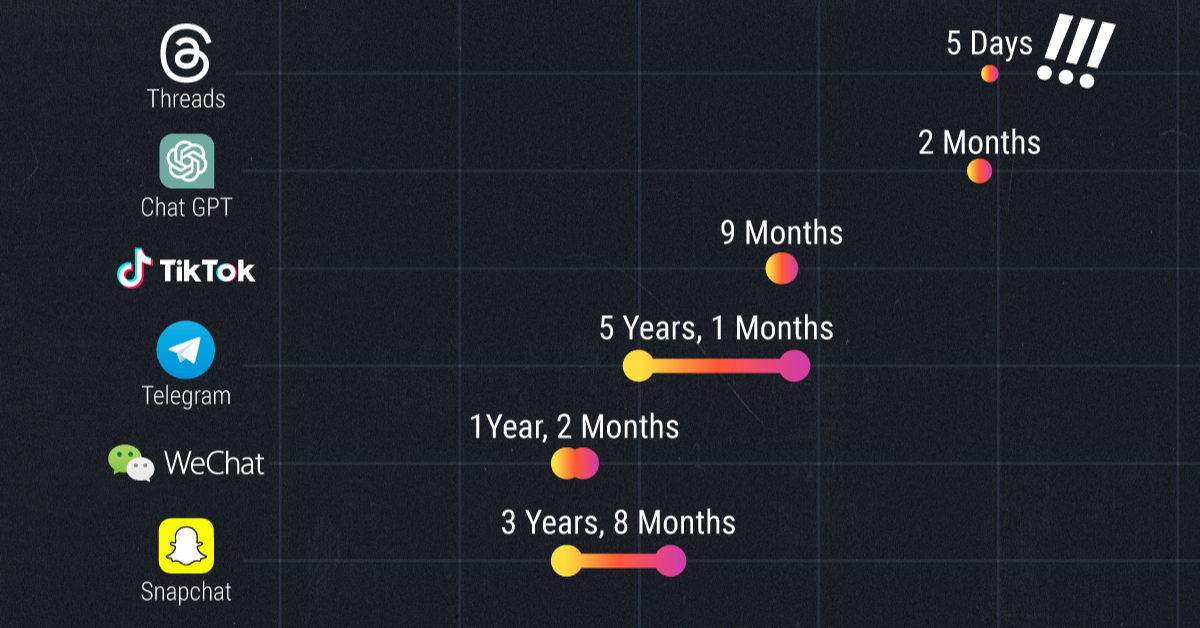
How Long it Took for Popular Apps to Reach 100 Million Users
Of Twitter’s many new rivals, Meta’s newest social media platform Threads has established its presence with a bang.
According to Meta founder Mark Zuckerberg, Threads took only 5 days to reach the key threshold of 100 million users. It achieved this milestone through organic demand—and no paid promotions required—smashing all previous records.
But how long have other popular platforms—TikTok, Instagram, and YouTube to name a few—taken to build their user base? Pulling data from PwC and Yahoo, we rank how long it took popular platforms to get to 100 million users.
Ranking Every Apps Journey to 100 Million Users
In first place, Threads has a significant lead over the rest of the pack with its five day achievement, and may have built a significant moat in holding on to this record.
Firstly, its launch coincided with Twitter’s viewing limit decision, and rode the wave of dissatisfaction aimed at Twitter’s current owner, Elon Musk.
Secondly, new users on Threads need an Instagram account to register, thus eliminating sign-up barriers and leveraging Instagram’s 1.2 billion-strong user base.
Here’s the journey length of popular platforms to attaining 100 million users:
| Rank | Platform | Launch | Time to 100M Users |
|---|---|---|---|
| 1 | Threads | 2023 | 5 days |
| 2 | ChatGPT | 2022 | 2 months |
| 3 | TikTok | 2017 | 9 months |
| 4 | 2011 | 1 year, 2 months | |
| 5 | 2010 | 2 years, 6 months | |
| 6 | Myspace | 2003 | 3 years |
| 7 | 2009 | 3 years, 6 months | |
| 8 | Snapchat | 2011 | 3 years, 8 months |
| 9 | YouTube | 2005 | 4 years, 1 month |
| 10 | 2004 | 4 years, 6 months | |
| 11 | Spotify | 2006 | 4 years, 7 months |
| 12 | Telegram | 2013 | 5 years, 1 month |
| 13 | 2006 | 5 years, 5 months | |
| 14 | Uber | 2011 | 5 years, 10 months |
| 15 | 2010 | 5 years, 11 months | |
| 16 | Google Translate | 2006 | 6 years, 6 months |
| 17 | World Wide Web | 1991 | 7 years |
| 18 | 2003 | 7 years, 11 months |
Ranked second, Open AI’s ChatGPT launched in November 2022 and hit 100 million users by the start of the new year. ChatGPT introduced the incredible capabilities of large language models to the masses, prompting a rush of sign-ups, and reviving old conversations around the potential consequences of AI.
Coming in at third place, ByteDance’s TikTok took just 9 months to reach 100 million users after its launch in 2017. Like Threads, TikTok benefited from another app, accessing popular lip syncing app Musical.ly’s existing user base after it was acquired and folded into TikTok.
WeChat and Instagram round out the top-five, also with interesting advantages. WeChat, an instant messaging platform similar to WhatsApp, benefited from its unique access to China’s notoriously closed internet market of 500 million users in 2012.
Meanwhile, Meta acquired Instagram when the photo-sharing platform had 30 million users, and more than tripled that number past 100 million in just one year.
And while Facebook ranks solidly middle-of-the-pack for fastest to 100 million users, it remains the platform with the most monthly active accounts, at nearly 3 billion. In fact, Meta’s lessons learned from Facebook have been well-leveraged, and the company owns 4 of the fastest apps to register 100 million users.
So What Does Threads Success Mean for Twitter?
Coming back to Threads’ incredible feat, however, it’s still early days whether an en-masse switch from Twitter is on the cards for Meta’s newest platform.
For one, Threads has faced significant criticism due to its intensive data collection practices and lack of accessibility features. It also is missing some key features from its rival, including trending topics, hashtags, and direct messages.
Meanwhile Elon Musk has been less than pleased with Threads’ success, deeming it a copy of Twitter and even threatening legal action.
Competition is fine, cheating is not
— Elon Musk (@elonmusk) July 6, 2023
So where does this leave the increasingly-crowded social media space? The next decade will set the stage for either more platform consolidation, or even further audience fragmentation.
-
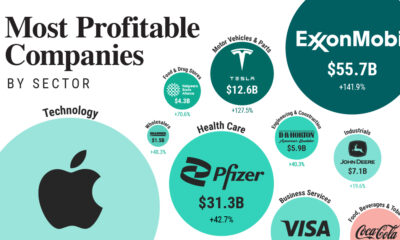
 Markets2 weeks ago
Markets2 weeks agoRanked: The Most Profitable U.S. Companies, by Sector
-
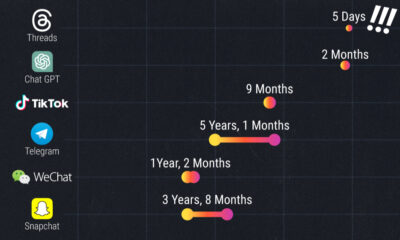
 apps5 days ago
apps5 days agoHow Long it Took for Popular Apps to Reach 100 Million Users
-
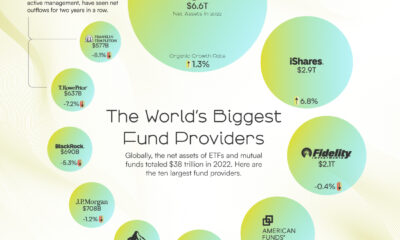
 Markets4 weeks ago
Markets4 weeks agoThe World’s Biggest Mutual Fund and ETF Providers
-
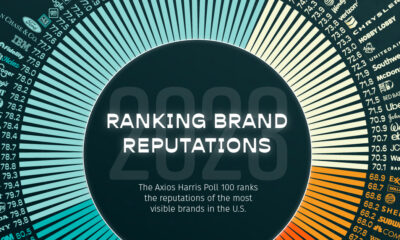
 Brands2 weeks ago
Brands2 weeks agoBrand Reputations: Ranking the Best and Worst in 2023
-
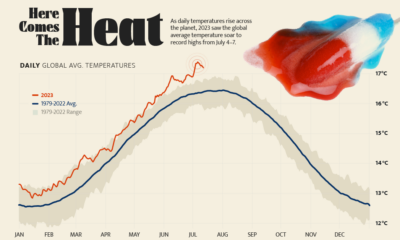
 Environment5 days ago
Environment5 days agoHotter Than Ever: 2023 Sets New Global Temperature Records
-

 Datastream4 weeks ago
Datastream4 weeks agoCan You Calculate Your Daily Carbon Footprint?
-
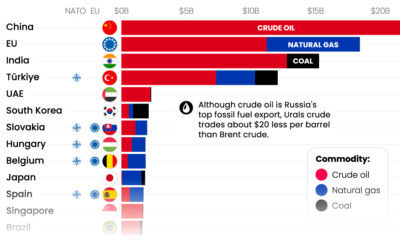
 Energy2 weeks ago
Energy2 weeks agoWho’s Still Buying Russian Fossil Fuels in 2023?
-

 VC+4 days ago
VC+4 days agoWhat’s New on VC+ in July





